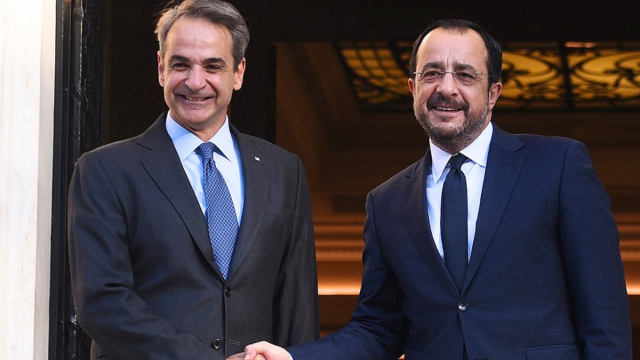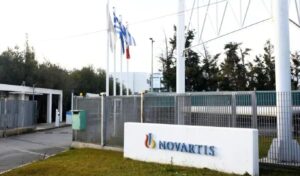The electrical interconnection cable between Greece and Cyprus will be the “elephant in the room” – according to the well-known Anglo-Saxon expression – at today’s third Intergovernmental Summit between Greece and Cyprus in Athens. The goal of the Summit, as government sources emphasize, is to intensify cooperation between the two countries and expand it across a series of sectors, beyond foreign policy, where cooperation and coordination between Athens and Nicosia is ongoing.
Summit on the Greece-Cyprus-Israel cable: The objective and cooperation sectors
Environment, Health, Education, Transport, Digital Policy, Housing Policy, Civil Protection, Justice, Culture and Foreign Policy are among the cooperation sectors that will be discussed by the relevant ministers of Greece and Cyprus with the aim of undertaking coordinated actions in the respective sectors, intensifying cooperation and exchanging best practices, as the same sources emphasize.
The latest developments in the region, the Cyprus issue following the election of Tufan Erhurman to the leadership of the Turkish Cypriot community, as well as the assumption of duties by the Republic of Cyprus of the Presidency of the Council of the European Union during the first half of 2026 are expected to be at the center of the meeting that Prime Minister Kyriakos Mitsotakis will have with the President of the Republic of Cyprus, Nikos Christodoulides.
Energy issues are also expected to be discussed, in light of recent developments. Mr. Mitsotakis will brief Mr. Christodoulides on the meetings with American officials and the agreements signed in Athens that upgrade Greece’s role geopolitically and energetically in the wider region and up to Ukraine.
The summit program
The Summit program includes a private meeting between Messrs. Mitsotakis and Christodoulides at the Maximos Mansion (10:35 – 11:35), bilateral contacts between ministers of the two countries, as well as the Intergovernmental Plenary (11:45 – 12:45), in which the two leaders and government members will participate. During the Plenary, the report of the previous Intergovernmental meetings will be presented, progress will be reviewed and new cooperation sectors will be determined that will define the “roadmap” for the coming years. After the conclusion of work, the Greek Prime Minister and Cypriot President will make joint statements to the media (12:45 – 13:05).
The three axes
The cable that will connect Greece’s electrical grid with Cyprus and subsequently with Israel is the third axis of the major energy “game” in which our country aspires to play a leading role. **The first axis** concerns hydrocarbon extraction, with ExxonMobil, the largest American energy company, signing an agreement the other day to acquire 60% of the concession in Block 2, in the maritime area in the northwestern Ionian Sea, and invest approximately $80 million so that in cooperation with Energean and HelleniQ Energy, exploratory drilling can proceed in late 2026 or early 2027.
**The second axis** involves strong investment and political interest from Washington for the Vertical Corridor, through which natural gas will reach from Alexandroupoli to Odessa – bypassing the Bosphorus straits – with the natural gas transmission pipeline from Greece to Bulgaria and subsequently Romania, Hungary, Slovakia, Moldova and Ukraine, to which is added the crucial agreement for a long-term American natural gas contract to Greece with DEPA and AKTOR.
The **third axis** concerns the electrical interconnection of Greece with Cyprus, with the known problems that have arisen in recent months. Athens and Nicosia appear determined to proceed with the necessary steps for the completion of the Greece-Cyprus-Israel electrical interconnection (Great Sea Interconnector, formerly EuroAsia Interconnector), which represents one of the largest and most ambitious underwater electrical transmission projects worldwide. Recently, after two years, the licenses were transferred to ADMIE and the two regulatory authorities RAAEY and RAEK have developed good communication lines and are attempting step-by-step to resolve technical and economic pending issues.
However, Israel’s Energy Minister Eli Cohen introduced a new parameter, that of possibly constructing first the Israel-Cyprus section and then the Cyprus-Greece section. *”Right now, according to plan, the first phase is to create the line between Crete and Cyprus and the second is to create between Cyprus and Israel. Perhaps we should consider changing the order and start with the Israel-Cyprus connection in order to save time,”* he stated in an interview with “Kathimerini tis Kyriakis.”
US support
The electrical interconnection issue was reportedly discussed last Thursday at the Zappeion, within the framework of the 3+1 Energy Ministers Summit (Greece, Cyprus, Israel and the United States), with the joint communiqué including a paragraph that could be interpreted as **indirect US support for the project**. *”The ministers reaffirmed their support for broader regional connectivity projects, both those already underway and future ones, within the framework of the India-Middle East-Europe Corridor (IMEC), in energy development and cooperation for the protection of energy infrastructure,”* the joint statement notes. Mr. Papastaurou even mentioned speaking to Ertnews that in this meeting *”US support was declared for all energy connection projects that exist or will be created, the creation of an energy hub, ensuring stability and strengthening the Eastern Mediterranean.”*
For this contentious issue, Environment and Energy Minister Stavros Papastaurou, his Cypriot counterpart Georgios Papanastasiou, and European Union Energy Commissioner Dan Jørgensen will meet today in Brussels, in an attempt to find **common ground for resolving pending issues**. The European Commissioner, moreover, responding to a question from MEP Nikos Farantouris days ago, stated that *”the Great Sea Interconnector (GSI) pipeline is a project of strategic importance that will end Cyprus’s energy isolation.”* As he noted subsequently, **”the Commission strongly supports the GSI project,”** which is a project of common interest (PCI) and to which a grant of €657 million has been allocated within the framework of the “Connecting Europe” mechanism. Mr. Papanastasiou, when asked at the Zappeion (by “Parapolitika”) about the electrical interconnection project, acknowledged that *”it has technical, economic and geopolitical challenges”* and avoided answering about its implementation.
Kyriakos Mitsotakis – who had privately discussed this issue with Nikos Christodoulides in September in New York – has decided to **move along two lines**: First, that Greece-Cyprus relations remain undisturbed, regardless of this project’s development. Second, that the project will proceed provided the economic-technical pending issues are resolved.




